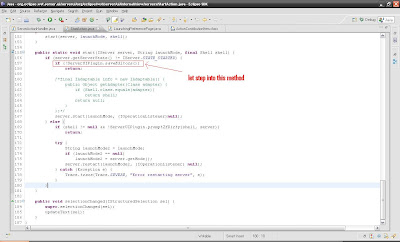My first walk through ends at the saveALl() method which is belong to class: EditorManager.class (package: org.eclipse.ui.internal;)
Method: saveAll()
Package: org.eclipse.ui.internal
// Use a simpler dialog if there's only one
if (modelsToSave.size() == 1) {
Saveable model = (Saveable) modelsToSave.get(0);
String message = NLS.bind(WorkbenchMessages.EditorManager_saveChangesQuestion, model.getName());
// Show a dialog.
String[] buttons = new String[] { IDialogConstants.YES_LABEL, IDialogConstants.NO_LABEL, IDialogConstants.CANCEL_LABEL };
MessageDialog d = new MessageDialog(
shellProvider.getShell(), WorkbenchMessages.Save_Resource,
null, message, MessageDialog.QUESTION, buttons, 0);
int choice = SaveableHelper.testGetAutomatedResponse();
if (SaveableHelper.testGetAutomatedResponse() == SaveableHelper.USER_RESPONSE) {
choice = d.open();
}
// Branch on the user choice.
// The choice id is based on the order of button labels
// above.
switch (choice) {
case ISaveablePart2.YES: // yes
break;
case ISaveablePart2.NO: // no
return true;
default:
case ISaveablePart2.CANCEL: // cancel
return false;
}
}
From the blocks of codes above:
MessageDialog d = new MessageDialog(...);
will define the Save Resource dialog
choice=d.open()
will display the dialog and get the return values when user click YES,NO,or CANCEL.
METHOD THAT DEFINE THE MESSAGEDIALOG:
package org.eclipse.jface.dialogs;
MessageDialog.class
public MessageDialog(Shell parentShell, String dialogTitle,
Image dialogTitleImage, String dialogMessage, int dialogImageType,
String[] dialogButtonLabels, int defaultIndex) {
super(parentShell);
this.title = dialogTitle;
this.titleImage = dialogTitleImage;
this.message = dialogMessage;
switch (dialogImageType) {
case ERROR: {
this.image = getErrorImage();
break;
}
case INFORMATION: {
this.image = getInfoImage();
break;
}
case QUESTION: {
this.image = getQuestionImage();
break;
}
case WARNING: {
this.image = getWarningImage();
break;
}
}
this.buttonLabels = dialogButtonLabels;
this.defaultButtonIndex = defaultIndex;
}
METHOD THAT DISPLAY AND GET THE RETURN VALUE:
package org.eclipse.jface.window;
Window.class
public int open() {
if (shell == null || shell.isDisposed()) {
shell = null;
// create the window
create();
}
// limit the shell size to the display size
constrainShellSize();
// open the window
shell.open();
// run the event loop if specified
if (block) {
runEventLoop(shell);
}
return returnCode;
}
The runEvenLoop(shell) will display and wait until user select one of the button (YES, NO, CANCEL).
The returnCode will return the value that user selected. I tried with YES, NO, CANCEL and the return values are:
YES: returnCode=0
NO: returnCode=1
CANCEL: returnCode=2
GO back to the saveAll() method.
switch (choice) {
case ISaveablePart2.YES: // yes
break;
case ISaveablePart2.NO: // no
return true;
default:
case ISaveablePart2.CANCEL: // cancel
return false;
}
choice will have the return value of open() method above.
If choice=YES, the saveAll() will process on and save all changes (code below), go back out, and server is launched with new configuration.
if choice is NO or CANCEL, saveAll() wont save and just return true or false, go back out, and server is launched with old configuration.
CODES THAT SAVE THE SERVER EDITOR belong to saveAll() method above.
// Create save block.
final List finalModels = modelsToSave;
IRunnableWithProgress progressOp = new IRunnableWithProgress() {
public void run(IProgressMonitor monitor) {
IProgressMonitor monitorWrap = new EventLoopProgressMonitor(
monitor);
monitorWrap.beginTask("", finalModels.size()); //$NON-NLS-1$
for (Iterator i = finalModels.iterator(); i.hasNext();) {
Saveable model = (Saveable) i.next();
// handle case where this model got saved as a result of saving another
if (!model.isDirty()) {
monitor.worked(1);
continue;
}
SaveableHelper.doSaveModel(model, new SubProgressMonitor(monitorWrap, 1), shellProvider, closing || confirm);
if (monitorWrap.isCanceled()) {
break;
}
}
monitorWrap.done();
}
};
// Do the save.
return SaveableHelper.runProgressMonitorOperation(
WorkbenchMessages.Save_All, progressOp, runnableContext, shellProvider);



